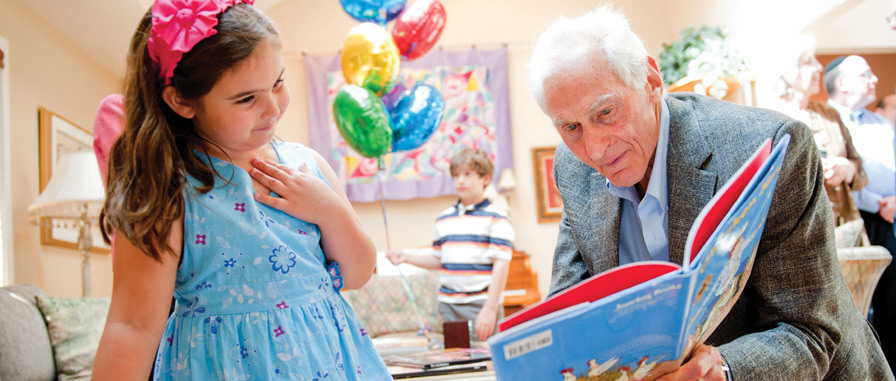 (Above) Harold Grinspoon delivers PJ Library's 3 millionth book in May 2012. In 2020, PJ Library surpassed 41 million Jewish children's books shared around the world.
(Above) Harold Grinspoon delivers PJ Library's 3 millionth book in May 2012. In 2020, PJ Library surpassed 41 million Jewish children's books shared around the world.
IN 2018, HAROLD GRINSPOON, THE CREATOR OF PJ LIBRARY, WON THE SYDNEY TAYLOR BODY-OF-WORK AWARD — ONE OF THE MOST PRESTIGIOUS JEWISH LITERARY HONORS. But when Harold was growing up, none of his teachers ever said, “That kid is going to make his name in the book world.” As a child with undiagnosed dyslexia, Harold struggled with literacy as a student. “I never could spell, I couldn’t write well, and I couldn’t read well either,” he remembers. Teachers had limited understanding of learning differences in those days, so Harold was pretty much on his own. “There was never a conversation about dyslexia at school or at home.”
But there were many conversations about Harold’s emotional state. “I was a screwed-up kid,” he says. “My main feeling then was fury, to be really truthful.” The antisemitism in his neighborhood compounded his struggles. “As a Jew, I got beat up on the stairway of the school and was not invited into other children’s homes.” Harold had a lot to be furious about, and the fact that the adults in his life had little idea of how to help him only made it that much harder. “If you go to school and you’re different, that’s always a problem. Kids like to be the same,” he says. “I was uncoordinated, so I couldn’t play sports. The music teacher even told me not to sing because my voice was so bad! But I wanted to prove that I was not such a screwed-up kid. I decided I was going to make money.”
And that’s just what he did — really well, in fact. Some of the same qualities that made him feel out of step at school — his natural curiosity, coupled with a perpetual outsider’s perspective — allowed him to notice opportunities that others overlooked. With a keen, insightful eye, for several decades he acquired and sold real estate that other buyers ignored, proving to himself and to those around him that he was indeed not a "screwed-up kid."
But his idea of what constituted success took a major turn when he received a cancer diagnosis. “Suddenly I didn’t want to just make money anymore. I knew I wanted to give it away Jewishly,” he recalls. “I had to change course.”
With the encouragement of Diane Troderman — Harold’s wife — and guidance from his close friend Rabbi Yitz Greenberg, Harold created the charitable foundation (the Harold Grinspoon Foundation) that carries his name.
But the concept of PJ Library, the flagship program of the Harold Grinspoon Foundation, was all his own. Once again, his natural curiosity and ability to think like an outsider helped him envision a program that would eventually foster Jewish connection in homes around the globe. That the program involved books — the very things that once contributed to Harold’s own sense of disconnection — is both ironic and poetic. But Harold points out that he always liked to read; he just did it slowly and needed to find books that spoke to him. He did it on his own terms — the way he does everything.
In early 2020, just before schools everywhere closed due to the pandemic, Harold spoke to a group of students at the Shefa School, a Jewish day school in Manhattan that serves students with language-based learning differences. He understood better than most what kind of struggles the students at Shefa face after having difficulty with reading as a child, and he didn’t have the advantage of attending a program devoted to meeting his challenges. He has succeeded beyond most people’s wildest imaginations — his own included.
“It was an incredible meeting,” says Dana Raucher, a parent who attended that talk at Shefa. “Harold connected eye to eye with those kids. He spoke openly and honestly about growing up as a kid who’s dyslexic and how that frustration can so easily turn to anger. You can’t let that anger guide you.” That is, after all, one of the secrets to Harold’s successful life story: The best way to get around anger at what you can't do is to figure out what you can do. “I think the most significant thing is to understand the beauty and nature of what we can all do with our genius,” Harold explains. “We all have genius in our lives. It’s all about having the opportunity to express yourself in the way that’s right for you, which I didn’t have as a kid. But I have it now.”